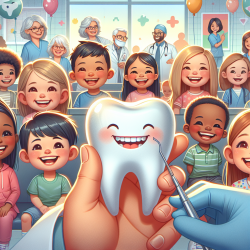Understanding Dental Caries in Medicaid-Insured Preschool Children
Dental health is a critical aspect of overall well-being, especially for young children. A recent study titled "Dental Caries in Medicaid-Insured Preschool Children With or Without Special Health Care Needs in Northeast Ohio" provides valuable insights into the dental health of preschoolers in this demographic. The study, conducted by Ronis et al. (2023), explores the prevalence of dental caries among Medicaid-enrolled preschoolers, with a particular focus on those with special health care needs (CSHCN).
Key Findings from the Study
The study revealed several important findings:
- CSHCN had a 34% reduced odds of untreated dental decay compared to children without chronic conditions.
- There was a lower caries experience among CSHCN, suggesting better access to oral health services.
- Despite the general assumption that CSHCN might have poorer dental health due to their conditions, the study found that these children might receive more regular dental care due to their frequent medical visits.
Implications for Practitioners
For practitioners working with preschoolers, especially those with special health care needs, this study offers several takeaways:
- Integrated Care Approach: The study highlights the importance of integrating dental health into routine medical care. Practitioners should consider dental assessments as part of regular health check-ups.
- Focus on Preventive Care: Emphasizing preventive care, such as fluoride varnish applications during well-child visits, can significantly reduce the incidence of dental caries.
- Education and Awareness: Educating parents about the importance of early dental visits and maintaining oral hygiene can lead to better health outcomes for children.
Encouraging Further Research
While this study provides valuable insights, it also opens the door for further research. Practitioners and researchers are encouraged to explore:
- The impact of socioeconomic factors on dental health outcomes in children.
- Longitudinal studies to assess the long-term effects of integrated dental and medical care.
- Innovative approaches to improve access to dental care for Medicaid-enrolled children.
Conclusion
The findings from this study underscore the importance of comprehensive care for preschoolers, particularly those with special health care needs. By integrating dental health into regular medical care and emphasizing preventive measures, practitioners can help ensure brighter smiles and healthier futures for all children.
To read the original research paper, please follow this link: Dental Caries in Medicaid-Insured Preschool Children With or Without Special Health Care Needs in Northeast Ohio.










